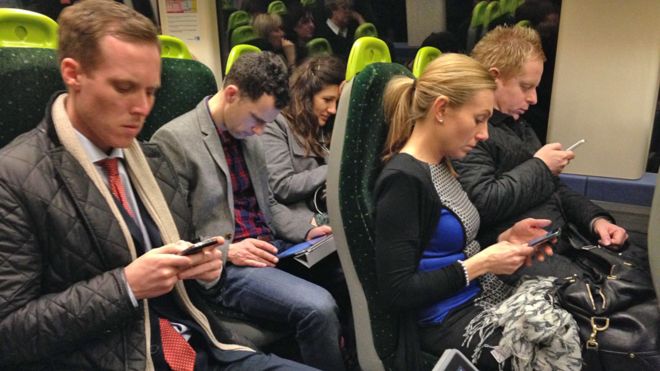(单词翻译:单击)
Commuters are so regularly using travel time for work emails that their journeys should be counted as part of the working day, researchers say.
研究人员表示,上班族经常利用通勤时间来收发电子邮件,这段路程也应该算作工作的一部分。
Wider access to wi-fi on trains and the spread of mobile phones has extended the working day, a study from the University of the West of England says.
英格兰西部大学的一项研究表明,火车上Wi-Fi的覆盖和移动电话的普及延长了工作时间。
The study examined 5,000 rail passengers on commuter routes into London as wi-fi became more available.
随着Wi-Fi变得更加普及,该研究对5000名乘坐通勤路线进入伦敦的铁路上班族进行了调查。
"I am a busy mum and I rely on that time," one commuter told researchers.
一位上班族告诉研究人员:“我是一个忙碌的母亲,我要好好利用通勤时间。”
The study found that 54% of commuters using the train's wi-fi were sending work emails. Others were using their own mobile phone connections for work emails.
该研究发现54%的通勤者使用火车的Wi-Fi发送工作电子邮件。其他人则使用自己的手机信号来收发工作电子邮件。
Those on the way to work were catching up with emails sent ahead of the coming day -- while those on the return journey were finishing off work not completed during regular working hours.
那些正在上班的人正在赶着回复头一天收到的邮件,而那些回程的人正在完成在正常工作时间内未完成的工作。

"It's dead time in a way, so what it allows me to do is finish stuff and not work in the evenings," said a commuter on the London to Birmingham route.
伦敦到伯明翰路线上的一位通勤者称:“在某种程度上这是一段停滞时间,所以我利用它来完成工作,而不用留到晚上。”
It showed that as internet access improved it had the effective consequence of extending working hours, using laptops and mobile phones.
该研究表明,随着互联网接入的改善,结果是人们使用笔记本电脑和手机来工作,工作时间延长。
But the findings raise questions about the work-life balance -- and whether it is healthy to stretch out the working day with people routinely answering emails beyond office hours.
但这些调查结果引发了工作与生活平衡的问题,以及延长工作时间,经常在办公时间以外的时间回复电子邮件是否健康。
If the journey has become part of work, should it also be recognised as part of working hours?
如果旅程已成为工作的一部分,那么它是否也应被视为工作时间的一部分?
Researcher Dr Juliet Jain said smartphones and mobile internet access had caused a "blurring of boundaries" between work and home life -- and this now applied to the journey to work.
研究员朱丽叶·詹恩博士表示,智能手机和移动互联网接入已经导致工作和家庭生活之间的“界限模糊”,现在这一点体现在去往工作的路上。
"How do we count that time? Do workplace cultures need to change?" she asked.
“我们如何计算那段时间?职场文化需要改变吗?”她发问道。
Instead of technology giving people more flexibility over working, the study showed that people were working extra hours on top of their time in the office.
该研究表明,技术并没有让人们更灵活地工作,相反,人们的工作时间超出了办公室工作时间。
Counting the journey as work could "ease commuter pressure on peak hours" travel, Dr Jain said, allowing more staggered travel times.
詹恩博士称,如果把通勤时间列入工作时间,“可以缓解高峰时段的通勤压力”,允许更多交错的通勤时间。
But she said it would also mean that employers would want "more surveillance and accountability" for how commuters were spending that time before arriving at their desks.
但她表示,这也意味着雇主希望能“有更多掌控与责任分配”,以确定通勤者在来到办公桌前是怎么利用那段时间的。


